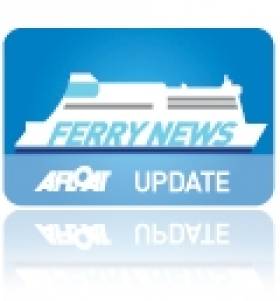Displaying items by tag: Torchbearer Eorann O'Neill
Port Out Starboard Home as Olympic Torch Travels P&OSH
#OLYMPIC FERRY– With 50 days to go to the start of the London Olympic Games, the torch-relay is to depart Northern Ireland this afternoon with P&O Ferries on the North Channel service to Scotland, writes Jehan Ashmore.
Before the flame reaches the Port of Larne, 67 torch-bearers will have carried the torch today on a near 120 mile journey across the north having departed Newcastle this morning.
A highlight of the day was a water crossing on Lough Neagh, where the flame was carried by the boat Island Warrior on the largest lake on the island of Ireland. Eorann O'Neil from Crumlin had the honour of torch-bearer and the 16 year-old was nominated for his dedication to swimming.
When the torch with its accompanying escort of support vehicles arrives in Larne mid-afternoon, the flame will be taken to an event to mark it leaving Northern Ireland. An hour later the torch's motorcade is to head for the port to board the P&O conventional ferry European Highlander on the 16.30hrs sailing for Cairnryan in Galloway. The 21,188grt ferry will arrive at the port on Lough Ryan some two hours later.
Tomorrow morning sees the start of the first relay in Scotland which is scheduled to start at 06.08hrs and takes place further down along Lough Ryan at the former ferryport of Stranraer.
The ferryport closed last November when Stena Line switched Scottish ferry terminals to Cairnryan, where sailings to Belfast are still maintained by a pair of 30, 285grt 'Superfast' sisters. Close to the new €80m Stena terminal is the existing terminal that serves P&O's operations.
Tomorrow's torch returns to Cairnryan as the relay route heads northwards to Glasgow which marks the day's final destination. After the torch completes touring Scotland the relay will cross the border to England to head back to London 70 days after originally embarking on a tour of the UK and detour to Dublin. The capital has been the only location visited by the torch relay outside that of the UK and Greece.
























































